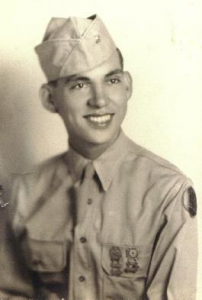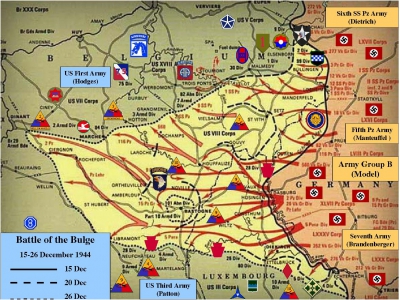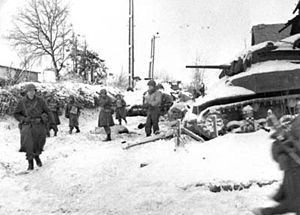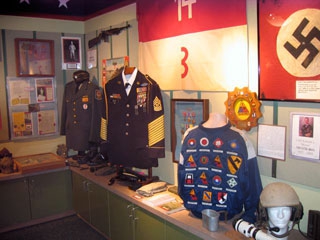You're in the Army Now - 1943

You're in the Army Now!
The year...1943
The war...World War II
The bombing of Pearl Harbor had already taken place December 7, 1941.
My father-in-law, Melvin Boyce Montgomery, then 18 years old was drafted in the army in July of 1943 to fight for country and honor and served in the 103rd Infantry.

Mel took an exam to be a "signalman." He made a perfect score. He was sent to Camp Crowder, Missouri for placement in the Signal Corps school as a result of his test score. He was to take 16 weeks of Basic training there.
He learned the Army Music School was also at hat camp. He3 got permission talk with them about auditioning for the Army Band. He auditioned on euphonium and drums and was accepted and transferred. He Played
Euphonium in the concert band and trap drums in the dance band.
After graduating from School of Music, he was assigned to the 103rd Infantry Band and sent to Camp Howze near Gainesville, TX. sometime in the summer.
 Somehow in the mix, the instruments disappeared and were replaced with guns, akin to the plowshares honed into swords.
Somehow in the mix, the instruments disappeared and were replaced with guns, akin to the plowshares honed into swords. Before he knew it, he was on a truck going across Europe. As he remembers and tells the story during his latest round of pain shots for his legs and back, He told the story:
"I was the last member to be assigned to that band It was originated in 1942
Until October we made preparations for overseas duty.
Oct. convoyed to Marsalis , France
From there by train to central France to join the push toward Germany and Rhine River.
Mid November to Dec. 22, Voges Mountain offensive..
Dec. 22, moved Westward by trucks to area near Luxemburg to join with Patton’s 3rd Army in defense at the Battle of the Bulge.
German army had advanced and pushed American line back that made a bulge in our lines and they surrounded the 101st Airborne Division and asked them to surrender and the commander responded with the word “Nut”"
It was December 1944.
 The players were in place, the chess pieces set to declare either "checkmate" or "surrender." He and his fellow soldiers wondered just what was on the horizon as they drove across the land south of Germany and France. It would be the largest and bloodiest battle fought in this war. Over 100,000 casualties for the German forces and the same for the American forces.
The players were in place, the chess pieces set to declare either "checkmate" or "surrender." He and his fellow soldiers wondered just what was on the horizon as they drove across the land south of Germany and France. It would be the largest and bloodiest battle fought in this war. Over 100,000 casualties for the German forces and the same for the American forces. The Battle: The Battle of the Bulge December 15th through January 25th, 1944.
Mel was given the order to guard a bridge through the night. A lone soldier given the order and the controls to detonate the bridge if the Germans came while he watched within sight of the artillery shack holding the explosives to destroy the bridge and everything surrounding it. He watched on that December night, alone, in the finger & toe numbing cold with the mind numbing, self destructive responsibility to watch and act, if necessary.
More in Mel's words:
"My unit was protecting the Germans from crossing a large river. Think it was called the Muse. Individuals from our unit manned shed with a detonator to blow the bridge if Russians started to advance. They never attempted. I would man the shed in 2 hour shifts with three other soldiers . When we were off we slept in an abandoned brick kiln near the bridge. After 8 hours another group of four would relieve us."

He told this story at his appointment for his pain shots from neuopathy in his feet. By the way, this appointment was the first time he was told that the neuropathy was probably from frostbite, frostbite most likely occurring in December of 1944. When asked by the doctor if he had ever been in a war, Mel told the story of guarding the bridge. He told the story about that lonely December night for the first time around a campfire on Christmas Eve in 2004 in the backyard at our home, 60 years after the battle. His wife of then 56 years, Jenny heard the story for thefirst time that Christmas Eve.
And after the Battle of the Bulge:
"We were attached to Patton's army from Dec. 22 to January 14 when the Battle of the Bulge was over as skies cleared and our Air Force bombed the Russians and cities along the Rhine. I think Patton was still the commander until March 15.
We then rejoined the 7th Army and crossed over the Rhine River in February and went through bombed out buildings in our entry in Germany cleaning out snipers. We then were sent to a rest area around ULM and other American units continued to advance.
In March our new General Anthony McAuliffe asked Patton to put us back in action or relieve him of his duties. 7th Army joined the advanced line on March 15 We moved through Germany and Bavaria without heavy resistance and moved into Austria and captured Innsbruck. While there we had a Division review and we got our instruments and played for the review for General Patton.
May 6th we moved into Italy to meet advanced American troops coming up from the South. We drove in trucks for probably 100 miles and met the American forces. We turned around and went back to Innsbruck and they told us the War was over.
Stayed in Innsbruck for about five months. Did lots of playing. Went out with concert band and played for troops in the area. Also played in officer’s club at a mountain lodge for weekly dances. Also played concerts in the Opera House at Innsbruck. . When not performing we did Military Policeman patrols of the city. Then went somewhere in Czechoslovakia I and in Sept. was bused to LA Havre , France and boarded the Queen Mary to return to New York.
I was sent to Fort Campbell, Kentucky where I stayed until February when I was sent to Camp Atterbury in Indianapolis. I was discharged in February. Went to work for Brown and Root in building an airport in Conroe."

And so it unfolded that December, each soldier to fulfill their own destiny. Each soldier to take their part in this epic drama that molded our nation and our world.
And the band part? What happened to the instruments? Mel and his company was assigned in the months following the Battle of the Bulge to Innsbruck Austria.
 There, men were shouting as the trucks came into town that the war was over. The trucks brought supplies and....the instruments. Soon, Mel's Dance Band was reunited and exchanged their swords for plowshares and dotted the aural landscape with welcome joy, dancing and music!
There, men were shouting as the trucks came into town that the war was over. The trucks brought supplies and....the instruments. Soon, Mel's Dance Band was reunited and exchanged their swords for plowshares and dotted the aural landscape with welcome joy, dancing and music! So is the history of one Melvin Boyce Montgomery, born January 3rd, 1925 currently residing in Huntsville TX. One man, worlds of history.
Tagged: Patton's 3rd Army, You're in the Army Now, 1943 enlisted man, Mel Montgomery, father-in-law of Mari Montgomery of Mari Montgomery Realty fights in the Battle of the bulge, 103 infantry, 1943, world war II, world war 2, army, band, patton, memorial day, me
Login or create a profile to post a comment


